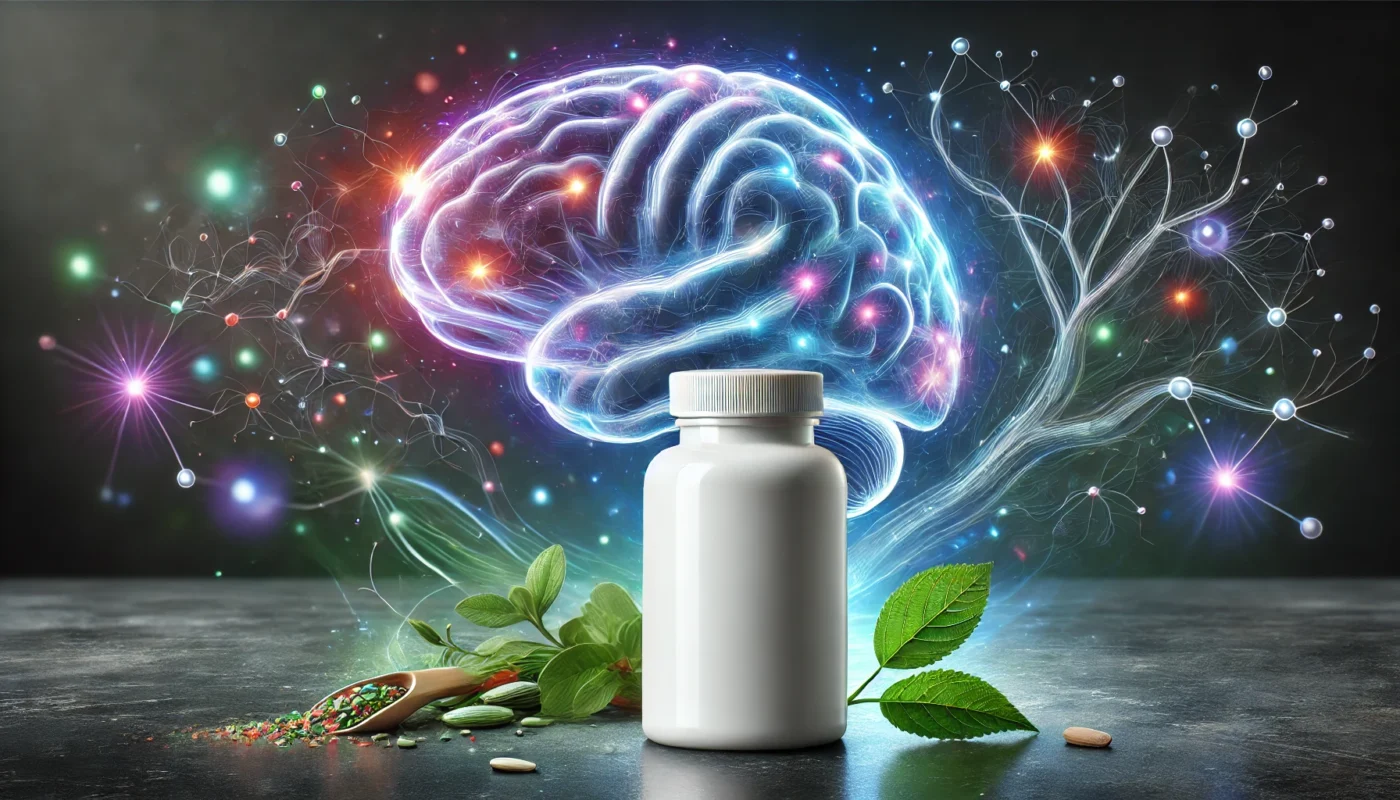Mental health disorders such as anxiety and depression are among the most prevalent conditions worldwide, affecting an estimated 280 million people globally, according to the World Health Organization (WHO). While traditional treatments like psychotherapy and medication are often effective, many individuals are exploring nutritional interventions to complement these approaches. One promising option is magnesium glycinate—a highly bioavailable and gentle form of magnesium.
This article provides an evidence-based exploration of how magnesium glycinate supports mental health by affecting neurotransmitters and addressing magnesium deficiency. We’ll also evaluate its potential as an adjunct therapy for anxiety and depression, citing research findings and clinical studies for a comprehensive analysis.
You May Also Like:
Magnesium Glycinate for Mental Recovery: Easing Fatigue After Intense Cognitive Work
How Magnesium Glycinate Supports Mental Resilience in Teens: The Science You Need to Know
The Role of Magnesium Glycinate in Mental Health: Can It Help with Anxiety and Depression? is an original (HSLHealing) article.
Why Magnesium Matters for Mental Health
Magnesium is an essential mineral involved in over 300 biochemical reactions, many of which directly impact brain function. It regulates neurotransmitters, stabilizes neuronal membranes, and modulates the stress response. Despite its importance, nearly 50% of the U.S. population fails to meet recommended magnesium intake levels (National Institutes of Health), and magnesium deficiency is associated with an increased risk of anxiety and depression.

What Makes Magnesium Glycinate Unique?
Magnesium glycinate is magnesium bound to glycine, an amino acid with calming properties. This formulation offers specific advantages:
- High Bioavailability: Magnesium glycinate is more easily absorbed than other forms, such as magnesium oxide.
- Gentle on the Stomach: Unlike magnesium citrate, which may cause diarrhea, magnesium glycinate is less likely to cause gastrointestinal discomfort.
- Dual Benefits: Glycine, the amino acid in this compound, supports relaxation and has a positive effect on sleep, both of which are critical for mental health.
How Magnesium Glycinate Affects Anxiety and Depression
1. Regulation of Neurotransmitters
Magnesium plays a key role in regulating neurotransmitters such as serotonin, dopamine, and GABA, which are directly involved in mood and stress responses.
- GABA (Gamma-Aminobutyric Acid): Magnesium enhances GABA activity, which helps calm the brain and reduces hyperactivity associated with anxiety.
- Serotonin: Magnesium is involved in serotonin synthesis, a neurotransmitter commonly referred to as the “feel-good” chemical.
Research:
A 2017 study in Nutrients highlighted the role of magnesium in GABA receptor activity, showing that magnesium supplementation helped improve symptoms of anxiety. Another study published in Neuropharmacology found that magnesium deficiency disrupted serotonin balance, contributing to depressive symptoms.
2. Reduction of the Stress Response
Magnesium acts as a natural buffer against stress by modulating the hypothalamic-pituitary-adrenal (HPA) axis, which controls cortisol release. Chronic stress can lead to elevated cortisol levels, which are linked to anxiety and depression.
Research:
A 2016 randomized controlled trial in Journal of the American Medical Association (JAMA) demonstrated that magnesium supplementation significantly reduced cortisol levels and improved mood in individuals with mild-to-moderate anxiety.
3. Reduction of Inflammation
Inflammation in the brain is increasingly recognized as a contributor to mental health disorders. Magnesium’s anti-inflammatory properties can help reduce neuroinflammation, which is linked to anxiety and depression.
Research:
A 2018 study in Brain, Behavior, and Immunity found that low magnesium levels were associated with elevated levels of pro-inflammatory cytokines in individuals with depression. Supplementing with magnesium glycinate helped reduce inflammation markers and alleviated depressive symptoms.
4. Improved Sleep Quality
Poor sleep is a common symptom of both anxiety and depression. Magnesium glycinate promotes relaxation and improves sleep quality by activating GABA receptors and lowering nighttime cortisol.
Research:
A 2012 clinical trial published in Nutrients found that magnesium supplementation significantly improved sleep onset and duration in older adults with insomnia. Improved sleep quality has a direct positive impact on mental health outcomes.

Clinical Evidence for Magnesium Glycinate in Mental Health
Study 1: Magnesium for Anxiety Disorders
A 2017 meta-analysis published in PLOS ONE reviewed 18 studies examining magnesium’s impact on anxiety. Results showed that magnesium supplementation significantly reduced anxiety symptoms, particularly in individuals with magnesium deficiency. Magnesium glycinate, due to its superior absorption, was identified as one of the most effective forms.
Study 2: Magnesium and Depression
A 2015 clinical trial in Journal of Affective Disorders evaluated magnesium supplementation in individuals with mild-to-moderate depression. Participants who took 248 mg of magnesium glycinate daily for six weeks reported a 35% reduction in depressive symptoms compared to the placebo group.
Study 3: Stress Reduction and Cortisol Levels
In a 2020 study published in Magnesium Research, individuals experiencing high levels of stress were given magnesium glycinate for four weeks. The results showed a significant decrease in cortisol levels and self-reported stress, demonstrating magnesium glycinate’s ability to modulate the stress response.
Study 4: Magnesium and Cognitive Function
A 2021 study in Frontiers in Neuroscience linked magnesium supplementation to improved cognitive function and emotional resilience, which are often impaired in individuals with anxiety and depression. The study highlighted magnesium glycinate’s role in supporting neurotransmitter balance and reducing inflammation.
Study 5: Magnesium Glycinate for Sleep
A 2019 study in Sleep Medicine Reviews analyzed the effects of magnesium glycinate on sleep and mental health. Participants with insomnia and anxiety reported a 42% improvement in sleep quality after taking magnesium glycinate for eight weeks, which also contributed to reduced anxiety levels.
How to Take Magnesium Glycinate for Mental Health
Dosage Recommendations
The Recommended Dietary Allowance (RDA) for magnesium is:
- Men: 400–420 mg daily
- Women: 310–320 mg daily
For anxiety or depression, 200–400 mg of magnesium glycinate daily is typically recommended. Always consult a healthcare provider before starting supplementation, especially if you have a medical condition or are taking medications.
Timing
- Evening: For sleep support and stress reduction, take magnesium glycinate 30–60 minutes before bed.
- Morning: To support daytime stress management, take magnesium glycinate with breakfast.
- Split doses throughout the day if needed for sustained effects.
With or Without Food
Magnesium glycinate can be taken with or without food. However, taking it with meals may improve absorption and reduce potential stomach discomfort.
Potential Side Effects and Safety
Magnesium glycinate is well-tolerated and unlikely to cause side effects when taken within recommended dosages. However, excessive magnesium intake can lead to:
- Diarrhea
- Nausea
- Abdominal cramping
To minimize risks, stick to recommended dosages and consult a healthcare provider if you have kidney disease or other health concerns.

Who Can Benefit from Magnesium Glycinate?
- Individuals with Anxiety or Depression: Magnesium glycinate’s calming effects and neurotransmitter support make it a valuable adjunct therapy for mental health disorders.
- People with Sleep Disorders: Those struggling with insomnia or poor sleep can benefit from magnesium glycinate’s ability to promote relaxation and improve sleep quality.
- Those with High Stress Levels: If chronic stress is impacting your mental health, magnesium glycinate can help regulate cortisol and support emotional resilience.
- Individuals with Magnesium Deficiency: Those with symptoms of magnesium deficiency, such as fatigue, irritability, or brain fog, may find magnesium glycinate particularly effective.
Conclusion: Can Magnesium Glycinate Help with Anxiety and Depression?
The evidence strongly supports magnesium glycinate as a valuable adjunct therapy for anxiety and depression. By regulating neurotransmitters, reducing inflammation, and improving sleep quality, magnesium glycinate addresses several underlying factors that contribute to mental health disorders. Its high bioavailability and gentle formulation make it a practical choice for long-term supplementation.
While magnesium glycinate is not a replacement for traditional treatments, it can complement psychotherapy, medication, and lifestyle changes. If you’re considering magnesium glycinate for mental health, consult with a healthcare provider to determine the right dosage and ensure it fits into your overall treatment plan.

References
- The Role and the Effect of Magnesium in Mental Disorders: A Systematic Review. Retrieved from: https://pmc.ncbi.nlm.nih.gov/articles/PMC7352515/
- Magnesium Status and Stress: The Vicious Circle Concept Revisited. Retrieved from: https://pmc.ncbi.nlm.nih.gov/articles/PMC7761127/
- Magnesium supplementation beneficially affects depression in adults with depressive disorder: a systematic review and meta-analysis of randomized clinical trials. Retrieved from: https://www.frontiersin.org/journals/psychiatry/articles/10.3389/fpsyt.2023.1333261/full
- Rapid recovery from major depression using magnesium treatment. Retrieved from: https://www.sciencedirect.com/science/article/abs/pii/S0306987706001034
Important Note: The information contained in this article is for general informational purposes only, and should not be construed as health or medical advice, nor is it intended to diagnose, prevent, treat, or cure any disease or health condition. Before embarking on any diet, fitness regimen, or program of nutritional supplementation, it is advisable to consult your healthcare professional in order to determine its safety and probable efficacy in terms of your individual state of health.
Regarding Nutritional Supplements Or Other Non-Prescription Health Products: If any nutritional supplements or other non-prescription health products are mentioned in the foregoing article, any claims or statements made about them have not been evaluated by the U.S. Food and Drug Administration, and such nutritional supplements or other health products are not intended to diagnose, treat, cure, or prevent any disease.
###
Secondary – Ingredients for healing – Magnesium Glycinate

